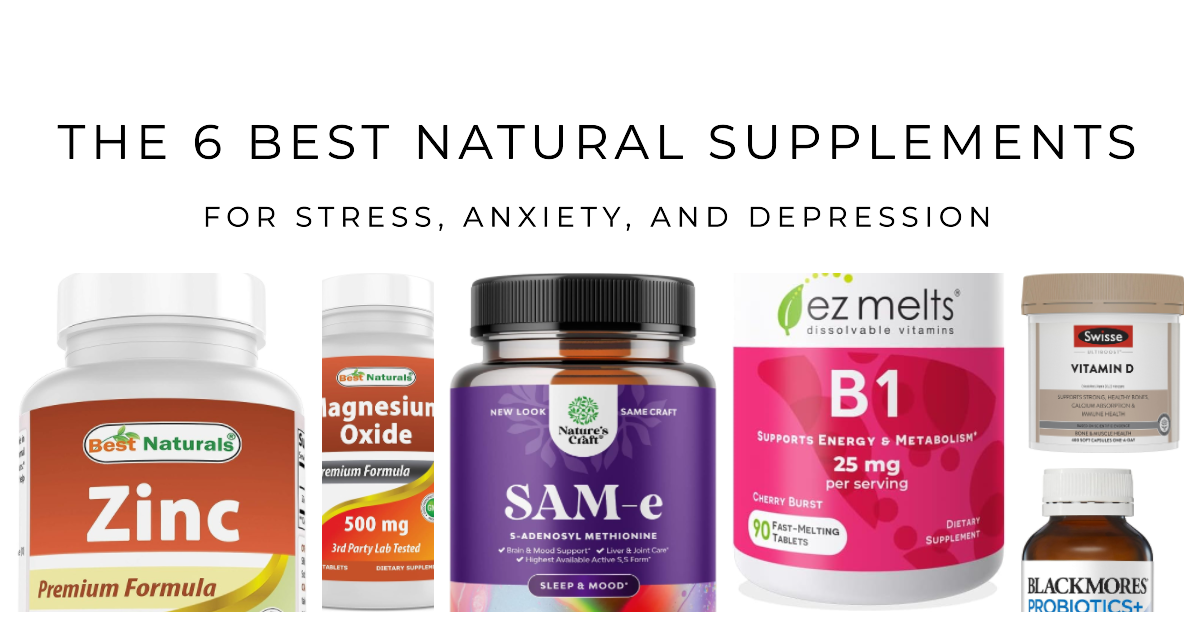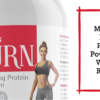Introduction
Key Takeaways
- Research indicates SAMe’s superiority over placebo and citalopram in reducing depression symptoms, but it’s not suitable for everyone, especially those with diagnosed Bipolar disorder.
- The gut-brain connection emphasizes the importance of a healthy gut for optimal brain function; neurotransmitters affecting mood are produced in the gut.
- Probiotics and prebiotics have shown potential in improving mental health and psychological function, emphasizing the significance of the gut-brain connection.
- Vitamin D plays a crucial role in reducing inflammation and improving gut health, with deficiencies linked to increased risks of anxiety and depression.
- Alongside nutrient supplementation, regular physical activity, relaxation techniques, and a balanced diet are essential for optimal mental health.
Products Mentioned in this Post
In this article, Simone Davis, a qualified naturopath, discusses the importance of nutrient deficiencies in relation to stress, anxiety, and depression. She highlights the role that zinc, magnesium, B vitamins, S-adenosyl methionine (SAMe), probiotics, and vitamin D play in supporting mental health. Davis emphasizes the need for a holistic approach to stabilizing mental health, and she recommends visiting a qualified naturopath to determine the underlying causes of mental health imbalances. By targeting specific nutrient deficiencies through supplementation and incorporating nutrient-rich foods into one’s diet, individuals can improve their overall well-being and support their mental health.
Zinc
Importance of Zinc for the Brain
Zinc is an essential nutrient that plays a crucial role in various enzyme reactions in the body, including those in the brain. It has been found to have the ability to reduce inflammatory processes in the brain and assist in modulating the immune system. Unfortunately, zinc is in high demand in times of stress, anxiety, and depression, leading to rapid depletion and ongoing imbalances.
Research has shown the efficacy of zinc in relation to mental health, and it works well alongside antidepressant medication. It is important to note that many medications, including the oral contraceptive pill, can deplete zinc in the body. To ensure an adequate intake of zinc, it is recommended to include foods such as beef, brewer’s yeast, bilberry, egg yolk, ginger, herrings, liver, milk, lamb, oysters, sunflower and pumpkin seeds, seafood, whole grains, and yeast in your diet regularly.
One of the foremost supplements for immune support is the Best Naturals Zinc supplement as Zinc Gluconate 50mg 240 Tablets. Zinc is essential for various body processes, including cognitive functions and maintaining emotional stability.
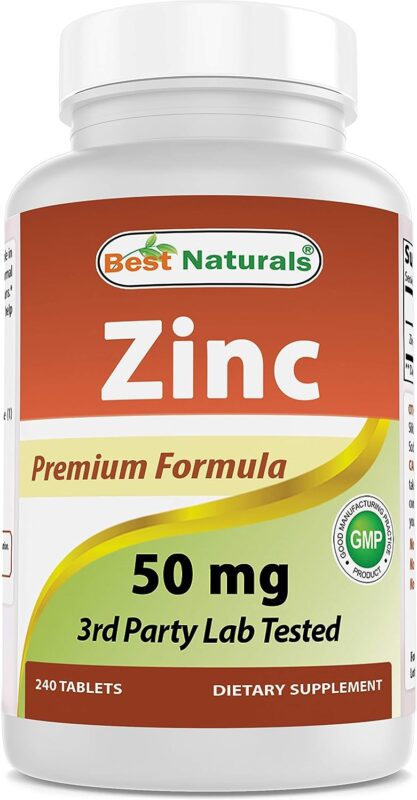
Photo: Amazon
One important thing to keep in mind when taking zinc supplements is to avoid taking them alongside iron and calcium supplements, as these minerals compete for absorption in the body.
Depletion of Zinc in the Body
Stress, anxiety, and depression can lead to the rapid depletion of zinc in the body. When under stress, your body demands more zinc to support various functions, including brain health and immune system modulation. This increased demand, combined with poor dietary intake or inadequate absorption, can result in zinc deficiency.
Zinc deficiency can have a significant impact on mental health, as this essential nutrient plays a crucial role in neurotransmitter synthesis, cognitive function, and mood regulation. Therefore, it is important to ensure an adequate intake of zinc through diet or supplementation to support optimal brain function and mental well-being.
Food Sources of Zinc
Including zinc-rich foods in your diet can help ensure an adequate intake of this essential nutrient. Some of the food sources that are rich in zinc include beef, brewer’s yeast, bilberry, capsicum, egg yolk, ginger, herrings, liver, milk, lamb, oysters, sunflower and pumpkin seeds, seafood, whole grains, and yeast.
It is important to note that the bioavailability of zinc from plant-based sources may be lower compared to animal-based sources. Therefore, if you follow a vegetarian or vegan diet, it is advisable to pay extra attention to ensuring an adequate zinc intake or consider supplementation under the guidance of a healthcare professional.
Interaction with Iron and Calcium
When taking zinc supplements, it is crucial to be mindful of the timing and avoid taking them alongside iron and calcium supplements. This is because these minerals compete for absorption in the body.
Iron and calcium supplements, when taken together with zinc, can interfere with the absorption of zinc and potentially lead to inadequate zinc levels in the body. To ensure optimal absorption and utilization of zinc, it is recommended to take zinc supplements separately from iron and calcium supplements.
Magnesium
Roles of Magnesium in the Human Body
Magnesium is a vital macro-mineral that plays numerous roles in the human body. It serves as a cofactor in more than 300 enzymatic reactions and is essential for the regulation of muscle contraction, blood pressure, insulin metabolism, and the synthesis of DNA, RNA, and proteins.
In the nervous system, magnesium is crucial for optimal nerve transmission, neuromuscular coordination, and protection against excitotoxicity, which is excessive excitation that can lead to cell death. Adequate magnesium levels are necessary for maintaining overall health and well-being, including optimal cognitive function and mental health.
Best Naturals Magnesium Oxide 500mg 360 Tablets offers a year’s supply of crucial magnesium, known for its relaxation properties and muscle recovery benefits. Magnesium deficiency is often linked with heightened stress and anxiety.
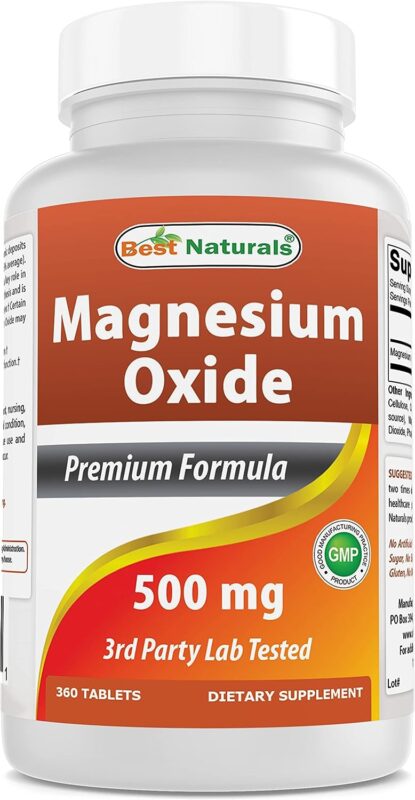
Photo: Amazon
Increased Need for Magnesium
Certain factors and conditions can increase the body’s need for magnesium. Individuals who regularly consume alcohol, drink excess coffee, suffer from chronic fatigue, experience diarrhea, have diabetes, or are under emotional stress may have an increased demand for magnesium. These factors can deplete magnesium levels in the body, leading to potential deficiencies.
In cases of anxiety, stress, and depression, magnesium supplementation may be beneficial. Research suggests that magnesium plays a role in supporting these conditions and can help increase energy levels and promote restful sleep.
Benefits for Anxiety, Stress, and Depression
Magnesium has shown potential benefits in relieving symptoms of anxiety, stress, and depression. It is thought to have a calming effect on the nervous system and can help regulate mood by supporting neurotransmitter synthesis and function.
Studies have shown that individuals with higher magnesium intake tend to have a lower risk of developing depressive symptoms, indicating the importance of maintaining optimal magnesium levels for mental well-being.
Food Sources of Magnesium
Including magnesium-rich foods in your diet can help ensure an adequate intake of this essential mineral. Some food sources that are rich in magnesium include almonds, barley, brewer’s yeast, cashews, cacao, figs, kelp, cod, eggs, leafy greens, legumes, lima beans, mineral water, molasses, parsnips, seeds, soybeans, and wholegrain cereals.
It is important to note that the magnesium content in food can vary depending on factors such as soil quality, processing methods, and cooking techniques. Therefore, it is advisable to consume a varied diet that includes a wide range of magnesium-rich foods to obtain sufficient magnesium intake.
Interaction with Other Minerals
When supplementing with magnesium, it is important to consider any potential interactions with other minerals. Specifically, calcium and phosphate, as well as iron and manganese, may reduce the absorption of magnesium.
If you are taking calcium, phosphate, iron, or manganese supplements, it is recommended to take them separately from magnesium supplements to ensure optimal absorption of each mineral. Consulting with a healthcare professional or a qualified naturopath can provide further guidance on proper supplementation and ensuring optimal mineral balance.
B Vitamins
Role of B Vitamins in Lowering Homocysteine Levels
B vitamins, particularly B6, B12, and folate (B9), play an essential role in lowering homocysteine levels in the body. Elevated homocysteine levels can interfere with neurotransmission and contribute to the development of conditions such as depression.
Research has also revealed that individuals with depression tend to have lower serum levels of folate and dietary folate intake compared to those without depression. B vitamins are involved in the synthesis and regulation of neurotransmitters in the brain, such as dopamine and serotonin, which are closely linked to mood regulation.
A diet rich in B vitamins, including lean meats, fish, green leafy vegetables, legumes, and nuts, can help support optimal brain function and mental well-being.
For those seeking an energy boost and overall well-being, the EZ Melts Dissolvable Vitamin B1 Supplement is a perfect choice. B vitamins, especially B1, are essential for nervous system function and can positively influence mood.
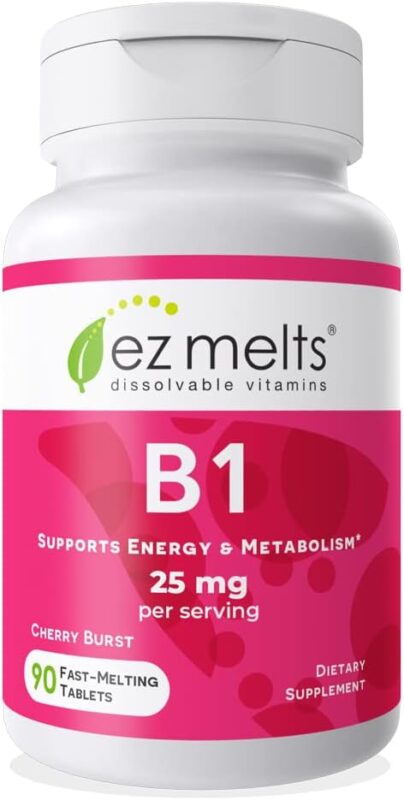
Photo: Amazon
Low Serum Levels of Folate in Depression
Studies have consistently shown a correlation between low serum levels of folate and depression. Folate, also known as vitamin B9, plays a vital role in DNA synthesis and methylation, which are essential for proper neurotransmitter synthesis and brain function.
Inadequate folate intake or low serum levels of folate can lead to imbalances in neurotransmitters such as serotonin and dopamine, which are closely associated with mood regulation. Therefore, ensuring an adequate intake of folate-rich foods or considering folate supplementation may be beneficial for individuals experiencing depression.
Synthesis and Regulation of Neurotransmitters
B vitamins, specifically B6, B12, and folate, are involved in the synthesis and regulation of neurotransmitters in the brain. Neurotransmitters, such as dopamine and serotonin, play a crucial role in mood regulation, and imbalances can contribute to the development of mental health conditions like anxiety and depression.
By supporting the synthesis and regulation of neurotransmitters, B vitamins help promote optimal brain function and mental well-being. Including a variety of B vitamin-rich foods in your diet, or considering a B vitamin supplement, can help ensure an adequate intake of these essential nutrients.
Food Sources of B Vitamins
B vitamins can be found in a wide range of foods, including both animal and plant-based sources. Some examples of B vitamin-rich foods include lean meats, fish, green leafy vegetables, legumes, nuts, whole grains, eggs, dairy products, and fortified cereals.
It is important to note that some individuals may have difficulties adequately metabolizing certain forms of B vitamins due to genetic defects. In such cases, it is advisable to choose activated forms of B vitamins or consult with a healthcare professional or qualified naturopath to determine the most suitable supplementation approach.
S-adenosyl methionine (SAMe)
Role of SAMe in Hormone Production and Regulation
S-adenosyl methionine (SAMe) is a compound naturally found in the body that plays a significant role in hormone production and regulation. SAMe supports the synthesis and regulation of various hormones, including those involved in mood regulation and overall well-being.
SAMe is also required for the metabolism of homocysteine, a compound that can interfere with neurotransmission and contribute to the development of depression. By supporting hormone production and regulating homocysteine metabolism, SAMe can have potential benefits for individuals experiencing stress, anxiety, and depression.
The Sam-E 200mg Mood Support Supplement is specifically tailored for natural stress relief. S-Adenosyl Methionine (SAMe) is a compound found in the body that increases dopamine and serotonin levels, key neurotransmitters in mood regulation.
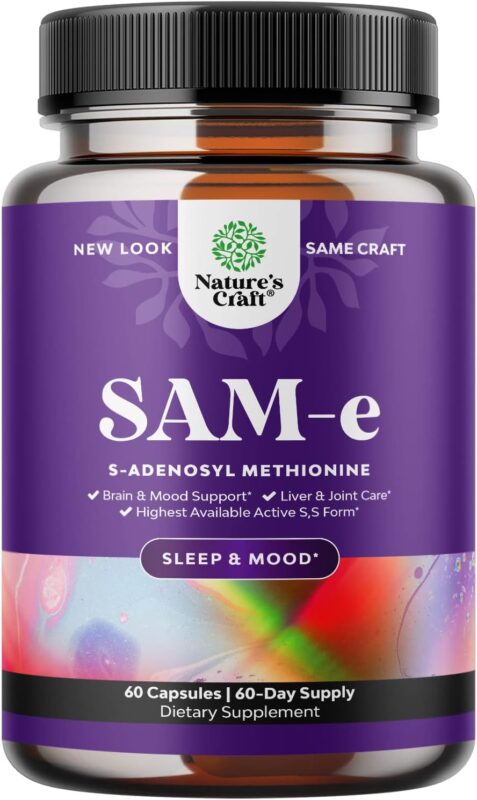
Photo: Amazon
Metabolism of Homocysteine
SAMe is involved in the metabolism of homocysteine, a compound that can have detrimental effects on neurotransmission and mood regulation. Elevated levels of homocysteine have been associated with an increased risk of developing depression.
By supporting the metabolism of homocysteine, SAMe may help reduce its levels in the body and contribute to improved mood and overall mental well-being. However, it is important to consult with a qualified natural health practitioner before considering SAMe supplementation, as it may not be suitable for everyone.
Superiority of SAMe over Placebo and Citalopram
Research has shown the superiority of SAMe over placebo and the antidepressant citalopram in reducing depression symptoms. In a study comparing SAMe to citalopram, SAMe was found to be superior to placebo in reducing depression at week 1, and superior to citalopram at weeks 2, 4, and 6.
The response rate and remission rate were also higher in the SAMe group compared to the citalopram group. SAMe has also been shown to reduce side effects related to antidepressant medications, including sexual dysfunction.
It is important to note that SAMe is not suitable for everyone, particularly individuals with diagnosed Bipolar disorder. It is advisable to seek professional guidance from a qualified natural health practitioner to determine if SAMe supplementation is right for you.
Reducing Side Effects of Antidepressants
SAMe has shown potential in reducing side effects related to antidepressant medications, particularly sexual dysfunction. Antidepressants can often cause undesirable side effects that may affect an individual’s overall well-being and treatment compliance.
SAMe has been found to have fewer side effects compared to certain antidepressant medications and can help mitigate some of the adverse effects associated with these medications. However, it is essential to consult with a healthcare professional or qualified naturopath before considering SAMe supplementation.
Advisability of Seeking Professional Guidance
Due to the potential interactions and individual variations in response, it is advisable to seek professional guidance from a qualified natural health practitioner when considering SAMe supplementation. A healthcare professional can assess your specific needs, medical history, and potential contraindications to determine if SAMe is an appropriate intervention for your mental health concerns.
Professional guidance can provide personalized recommendations and ensure the safe and effective use of SAMe as part of a comprehensive treatment plan for stress, anxiety, and depression.
Probiotics
Connection Between the Gut and the Brain
The connection between the gut and the brain is a growing area of research, highlighting the importance of a healthy gut for optimal brain function and mental well-being. The gut and brain communicate via the vagus nerve, the largest nerve in the body, allowing constant communication between the two.
Most of the neurotransmitters and hormones that affect our mood, such as serotonin, dopamine, and GABA, are produced in the gut. When we experience depression, stress, or anxiety, the brain sends signals to the gut that can hinder the proper functioning of gut bacteria and neurotransmitter production. On the other hand, imbalances in gut bacteria can send signals to the brain that can trigger anxiety or low moods.
Understanding this bidirectional communication between the gut and brain is crucial for promoting mental health and well-being.
Gut health, closely linked with mental well-being, can be supported by the Blackmores Probiotics + Adults Daily, ensuring a healthy gut-brain connection.
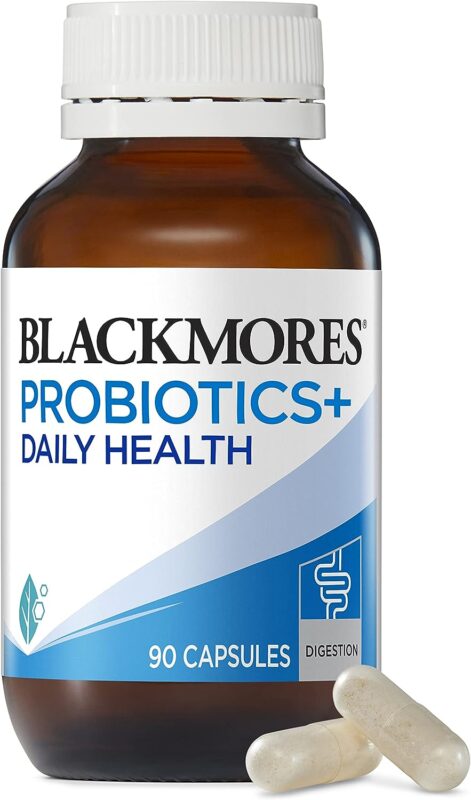
Photo: Amazon
Effect of Gut Bacteria on Mood
Gut bacteria play a significant role in mood regulation and mental health. Imbalances in gut bacteria, often referred to as dysbiosis, can contribute to the development of mental health conditions such as anxiety and depression.
The specific mechanisms by which gut bacteria affect mood and mental health are still being investigated. However, it is believed that gut bacteria can directly impact neurotransmitter production, regulate inflammation, influence the gut-brain axis communication, and modulate the immune system.
By promoting a healthy balance of gut bacteria, it is possible to positively influence mood and overall mental well-being.
Improvement of Mental Health and Psychological Function
Research has shown promising results regarding the improvement of mental health and psychological function through the use of probiotics and prebiotics. Probiotics are beneficial bacteria that can be ingested through supplements or consumed in certain foods. Prebiotics, on the other hand, are a source of food for these beneficial bacteria.
A systematic review published in 2020 concluded that probiotics and prebiotics can improve mental health and psychological function and may serve as potential new treatments for common mental disorders. These findings support the growing recognition of the gut-brain connection and the importance of maintaining a healthy gut for optimal mental well-being.
Food Sources of Probiotics
Including probiotic-rich foods in your diet is a natural and effective way to support a healthy gut and promote mental well-being. Some examples of probiotic-rich foods include pot set yogurts, fermented foods such as sauerkraut, kimchi, and other pickled vegetables.
When choosing probiotic-rich foods, opt for those that contain live and active cultures. These foods can help replenish and support beneficial gut bacteria, contributing to improved mood and mental health.
Importance of Prebiotics
Prebiotics are a type of dietary fiber that serves as food for beneficial gut bacteria. Including prebiotic-rich foods in your diet can help nourish and support the growth of these beneficial bacteria, promoting a healthy gut environment.
Some examples of prebiotic-rich foods include a wide variety of plant-based, whole foods such as fruits, vegetables, legumes, whole grains, and nuts. Consuming a diverse range of these foods can provide the necessary prebiotic fibers to support optimal gut health and mental well-being.
Vitamin D
Reduction of Inflammation and Improvement of Gut Health
Vitamin D has been found to play a role in reducing inflammation and improving gut health. Chronic inflammation in the body, including in the gut, can contribute to the development of various health conditions, including those affecting mental health.
Research suggests that vitamin D may have anti-inflammatory effects and can help create a more suitable environment for beneficial gut bacteria to thrive. By reducing inflammation and supporting gut health, vitamin D may indirectly contribute to improved mood and mental well-being.
Swisse Ultiboost Vitamin D capsules play a pivotal role in dietary calcium absorption, immune health, and mental wellness, as low Vitamin D levels are correlated with mood disorders.
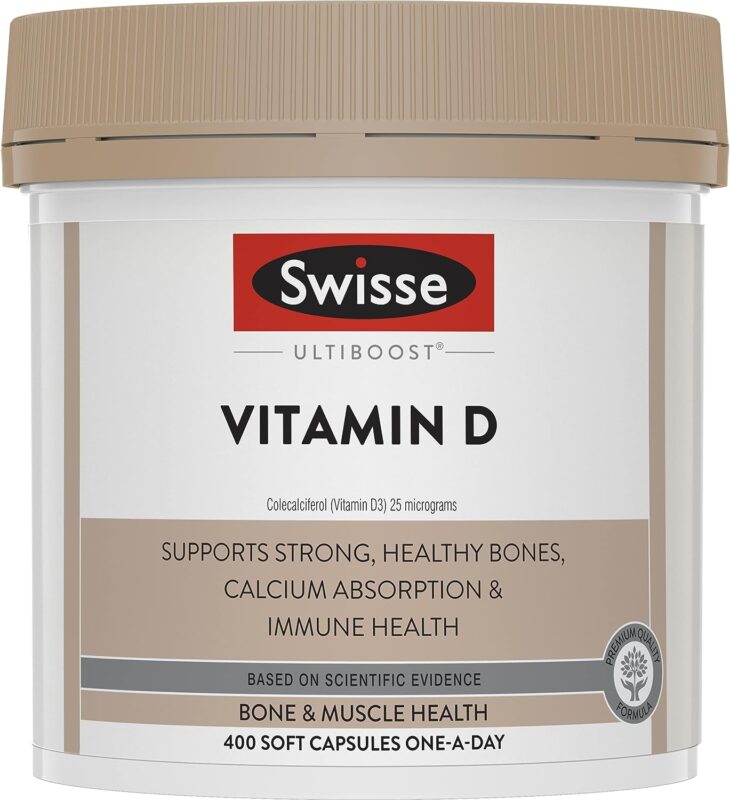
Photo: Amazon
Link Between Vitamin D Deficiency and Anxiety/Depression
Several studies have linked vitamin D deficiency to an increased risk of developing anxiety and depression. Low vitamin D levels have been associated with a higher incidence of these mental health conditions.
Vitamin D receptors are present in various regions of the brain involved in mood regulation, suggesting a potential direct influence of vitamin D on mental well-being. Ensuring adequate vitamin D levels through supplementation or safe sun exposure may be beneficial for individuals experiencing anxiety, stress, and depression.
Food Sources of Vitamin D
Vitamin D can be obtained from dietary sources and through sunlight exposure. Some food sources of vitamin D include fish liver oils (such as cod liver oil), fatty fish such as cod, halibut, and herring, butter, egg yolk, milk, and sprouted seeds.
However, it is important to note that food sources alone may not always provide sufficient vitamin D levels, especially during certain seasons or for individuals with limited sun exposure. In such cases, vitamin D supplementation under the guidance of a healthcare professional may be necessary to maintain optimal vitamin D levels.
Importance of Sun Exposure
Sun exposure is an important source of vitamin D, as the skin naturally produces vitamin D when exposed to sunlight. Spending a short amount of time outdoors during safe times of the day without sunscreen can help promote vitamin D synthesis in the body.
It is important to note that excessive sun exposure without proper protection can increase the risk of sunburn and skin damage. Therefore, it is recommended to seek a balance between safe sun exposure and sun protection measures, such as wearing sunscreen and protective clothing.
Other Aspects to Consider
Options for Supporting Mental Health
When it comes to supporting mental health, there are various options available. In addition to nutrient supplementation, there are other approaches and practices that can contribute to mental well-being.
Engaging in regular physical activity, practicing relaxation techniques such as meditation or deep breathing exercises, seeking support from loved ones or professionals, and adopting a well-balanced diet are all strategies that can support mental health. It is important to find a comprehensive approach that works best for you and addresses your specific needs and preferences.
Allied Health Practitioners Who Can Assist
In addition to seeking support from psychologists, counselors, and general practitioners, there are various allied health practitioners who can assist in supporting mental health. These professionals include naturopaths, nutritionists, dietitians, and integrative medicine practitioners.
Allied health practitioners can provide personalized guidance and recommendations tailored to your individual needs, considering factors such as nutrient deficiencies, dietary patterns, lifestyle habits, and potential interactions with medications.
Crucial Link Between Diet and Mental Health
The link between diet and mental health is crucial and should not be overlooked. The foods we consume can impact our brain function, neurotransmitter production, and overall mental well-being.
A balanced diet that includes a variety of nutrient-dense foods, such as fruits, vegetables, lean proteins, whole grains, and healthy fats, can provide the necessary nutrients to support optimal brain function and mental health. Making informed choices about what we eat and considering the potential benefits of targeted nutrient supplementation can contribute to a holistic approach to supporting mental health.
FAQ (Frequently Asked Question)
Q: Why is Zinc essential in managing stress and depression?
A: Zinc plays a vital role in neurotransmitter function and is essential for cognitive and emotional stability. Deficiency can lead to heightened stress and anxiety.
Q: How does Magnesium contribute to relaxation?
A: Magnesium is known to relax nerve impulses and muscle contractions, promoting relaxation. It can help in reducing anxiety and promoting better sleep.
Q: Why are B vitamins crucial for mental health?
A: B vitamins, especially B1, support nervous system function, ensuring efficient neurotransmitter synthesis which can positively influence mood and energy levels.
Q: What is the link between gut health and mental well-being?
A: The gut and brain are intricately connected. A healthy gut promotes better neurotransmitter function, potentially reducing stress, anxiety, and depression.
Q: Why is Vitamin D important for mental health?
A: Low Vitamin D levels have been associated with mood disorders. It’s crucial for neurotransmitter function and overall brain health.
Conclusion
Importance of Mental Health in Uncertain Times
In times of uncertainty and challenges, prioritizing mental health becomes even more crucial. Stress, anxiety, and depression are common conditions that can significantly impact quality of life and overall well-being. Addressing nutrient deficiencies and supporting mental health through targeted supplementation can be a valuable approach to promoting resilience and well-being.
While nutrient supplementation can play a role in supporting mental health, it is important to remember that it is just one aspect of a comprehensive approach. Seeking professional guidance, adopting healthy lifestyle practices, and considering other supportive strategies can contribute to a holistic and individualized approach to mental wellness.
Taking control over your diet and ensuring an optimal nutrient intake is a supportive measure that can empower you on your journey towards better mental health. Remember to consult with a healthcare professional or qualified naturopath to assess your specific needs and determine the most appropriate interventions for you.
Disclaimer
Please keep in mind that nothing said here should be construed as a substitute for professional medical or financial advice from a qualified financial advisor or a licensed healthcare provider. If you use pharmaceuticals or have concerns after reading the above review information, be sure to speak with a qualified physician or financial expert before making any purchasing decisions. Since the claims made about these products have not been reviewed by the Food and Drug Administration or Health Canada, individual outcomes may differ and cannot be guaranteed. Research that has been approved by the FDA or Health Canada has not attested to the efficacy of these products. These goods do not offer any form of get-rich-quick scheme and are not designed to diagnose, treat, cure, or prevent any ailment. The reviewer disclaims all liability for incorrect pricing. For exact prices, view the product sales page

